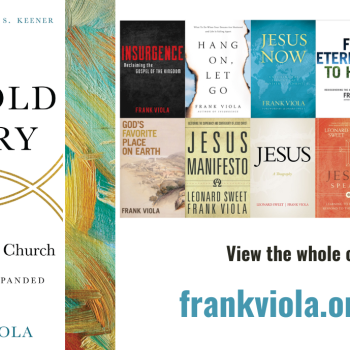 By Anne Howard
By Anne Howard
As one of the responders in Patheos' "The Future of Religion" series, I write from my perspective with The Beatitudes Society, where we are working to equip and connect the emerging generation of Progressive Christian leaders to be advocates for justice, compassion, and peace.
Two images are shaping my view of the landscape, and shaping my sense of the tasks at hand.
First is the image of midwifery, a metaphor named by my colleague The Rev. Ronald David, M.D, who supervises the CPE program at Good Samaritan Hospital in Los Angeles. He sees our work as that of being midwives, those "who sit patiently and compassionately with those in hard labor about to give birth to someone or something vital and precious." He says, "We live at a time wherein a new consciousness is dawning. Borrowing from Walter Wink, that consciousness is a threat to the powers that be. And just as the infant Jesus was a threat to the powers that be, every effort will be made to snuff out or silence the emerging consciousness. We are in the midst of that birthing and the midwife will see it safely through."
Something new is indeed emerging on the religious landscape, and I believe it is changing the broad landscape of Christianity into something we are not yet ready to recognize. Hence, we try out a series of labels describing this time, most of which begin with "post-" as we sense that we are post-something, from post-denominational to post-Christian. Phyllis Tickle's "great emergence" seems as close as we might come to naming our time, and it is clearly too early to give this "new thing" a label. I often recall the talk I heard twenty-plus years ago by Walter Brueggemann, in which he referred to some recent church kerfuffle about the ordination of women or gay marriage and said "we are witnessing the death throes of white, western, male hegemony." My entire ordained career has been about watching these death throes as they are expressed in fundamentalisms in Christianity as well as the world's great religions. I believe that now our task is to discern death throes from birth pangs, and to pay attention to the signs of new life. Our challenge is to be attentive to the birthing process.
Secondly I see the image of the public square, that place beyond our private lives and separate places of worship where we meet the other. Parker Palmer has described this place as "the company of strangers." In recent decades, we have abandoned the public square for our private silos, and we have narrowed the definition of public to mean only politics, the workings of government. Politics is one aspect of public life, a vital one, but a healthy democracy depends upon a robust "pre-political" engagement of strangers. Parker Palmer wrote (thirty years ago!) in The Company of Strangers: "Without a public which knows that it shares a common life, which is capable of feeling, thinking, debating, and deciding, politics becomes a theatre of illusion, with everyone watching the drama on stage, hoping to play some part, while the real action goes on backstage in the form of raw and unrestrained power. Without a public life, government becomes a sham, a show, an elaboration of techniques for manipulating the populace."
Living in the public square begins with that recognition that "we are all in this together," whether we are cleaning up Gulf Coast beaches or seeking Wall Street reform or supporting our local public schools. Commitment to the public life is an essential aspect of Progressive Christianity.
At the heart of Progressive Christianity is the same thing I see at the heart of the teaching of Jesus (as expressed in the Beatitudes): a commitment to the welfare of all, to a world of "shalom" for all, and therefore advocacy for compassion in public life. To borrow the pithy phrases of Marcus Borg, the practice of "the politics of compassion" (and consequently desisting from "the politics of purity") could be the most important task of our time. Progressive Christians enter the public conversation neither to provide "the right answer" nor to privilege Christianity over any other religion, (i.e., not to win converts to a particular version of Christianity) but rather to join with others to serve the common good. This means Progressive Christians find themselves to be on equal ground with people from all faiths as we commit ourselves to care for God's fragile creation and each other. Our challenge as people of faith is to re-discover and re-engage the public realm.




